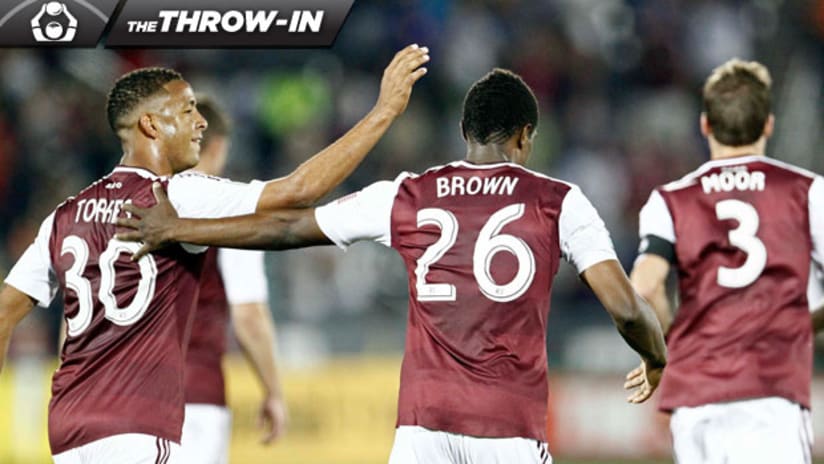We’ll lead with a disclaimer: The Colorado Rapids are technically not in the playoffs yet. But for the rest of the postseason-bound teams that aren’t paying attention, I’ve got a message for you:
You’d better hope it stays that way.
Barring a miracle sequence of events that would require the San Jose Earthquakes to score at least 13 goals against FC Dallas on Saturday, the Rapids will sew up the last playoff spot out of the Western Conference, and will return to the postseason for the first time in two years. And they are by far the most terrifying team in the field.
But don’t just take my word for it.
“You definitely don’t want to be facing them if you’re in the West,” New York midfielder Dax McCarty said in this week’s episode of March to the Match. “I think they’re really dangerous.”
McCarty knows this better than most thanks to his five seasons spent at FC Dallas. That’s where he got to know Drew Moor, who is now Colorado’s beating heart and their captain. And it’s how he came to respect the visionary Oscar Pareja, a former FCD assistant coach who is now watching his project blossom as a second-year head coach in Commerce City.
Those two men are perhaps more responsible than any for what is ironically the biggest development driving the Rapids’ success in 2013: a complete and utter lack of experience.
That’s right: Colorado are the team you least want to face in the playoffs because they’ve barely been there. And that failure to grasp the moment entirely is what could end up contributing to a stunning scalp when the playoffs get going next week.

On paper, the starting lineup looks like a rebuilding project. The goalkeeper and left back were playing in the USL PRO and NASL, respectively, last year. The central midfielder and one of the forwards are both rookies.
And yet Clint Irwin (at right), Chris Klute, Dillon Powers and Deshorn Brown all have legitimate claims on various league awards for 2013. Meanwhile Shane O’Neill – the guy with whom Moor has spent most of the season partnering in central defense – just turned 20 last month. Each of those five are also among the top eight Rapids in minutes played in 2013.
“They’ve done a fantastic job,” Moor told me earlier this month. “They’ve grown so much. I’ve enjoyed playing next to all these guys.”
But that also represents roughly half of the Rapids lineup with an average age of 22 and exactly zero playoff games between them. Moor is the relative elder hand (he’ll turn 30 in January), and as captain has been tasked much of the time with keeping the youngsters grounded. To a large degree, he says, ignorance is bliss.
“I think they’re using that to their strength,” he said. “Sometimes that’s a good thing. It can become stressful if you think about it too much.”
Then there’s Pareja’s reboot, a meticulous roster overhaul that saw the former Colombian international handpick difference-making players from all over Latin American that helped usher in his attack-centric 4-3-3.
The honest truth, however, is that a big reason why so many kids have been logging such major minutes this season is due to injuries to a lot of those players: Martín Rivero, Jaime Castrillón and Diego Calderón.
And yet the ethos has trickled down. The mentality on offense has been to break fast, look for openings and play quick one-two touch soccer without spending too much time on build-up play. According to prize midseason acquisition Vicente Sánchez, the tactics aren’t that different from some of the stops in his illustrious career, such as Mexican juggernauts Toluca and Club América.
“I really like the way this team attacks,” the Uruguayan journeyman told MLSsoccer.com earlier this week. “It’s a team that is always looking to get a goal. From the first minute, we’re looking for a way to get into the other end, an offensive-minded team.”
The results aren’t always tika-taka – the Rapids are merely average in most statistics when it comes to passing interplay resulting in goals. But when it does work, the end product is gorgeous.
WATCH: Torres' blistering winner vs. 'Caps
Take Designated Player Gabriel Torres’ Goal of the Week finalist against Vancouver last weekend: four touches off a turnover, including some pretty footwork by Sánchez and a cross-field switch Torres smashed into the net. (at right)
Or try on for size Castrillón’s equalizer against Real Salt Lake in August which was generated almost entirely by an overlapping Klute with seven separate touches in between. (Watch it here.)
Or if you're still hungry, how about Torres' laser beam to Brown last month against Seattle for a Colorado goal just 14 seconds after kickoff, the third-fastest goal in MLS history. (Watch it here.)
When the Rapids break, they’re full-speed ahead and have enough technical ability to produce a highlight-reel goal that leaves opposition scratching their heads in disbelief at how they let one get away. Think of them as the early 1990s Paul Westhead-coached Denver Nuggets … except that they actually play defense.
Very quietly, the Rapids have allowed the third-fewest goals in MLS. And they’re among the toughest to unlock for another reason: They’ve limited their opponents to a passing-accuracy rate in the final third that ranks as third-worst in the entire league.
In a one-off game or a two-legged series, these Rapids are more than capable of pulling an upset. But that defense? Well, they say that wins championships.
Jonah Freedman is the managing editor of MLSsoccer.com.













